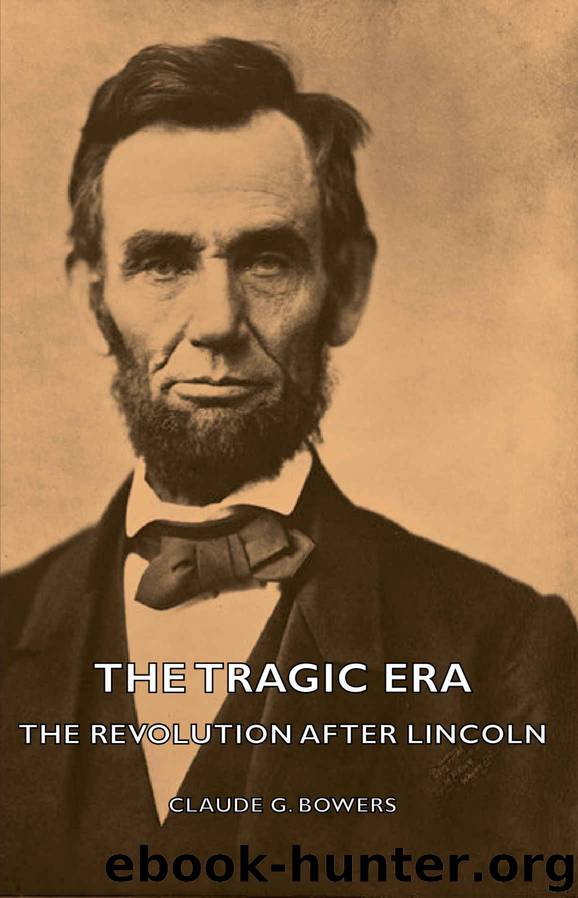The Tragic Era: The Revolution After Lincoln by Claude G. Bowers

Author:Claude G. Bowers [Bowers, Claude G.]
Language: eng
Format: epub
Tags: History, General
ISBN: 9781446546888
Google: HEV8CgAAQBAJ
Publisher: Read Books Ltd
Published: 2013-04-16T11:01:06+00:00
VII
The year ended like a melodrama. In December, Daniel McFarland walked into the office of the ‘New York Tribune’ and shot down Albert D. Richardson, a favorite journalist among the Radicals, said to have been living with the divorced wife of his assailant. Greeley himself was so shocked, he excused himself from attending an hilarious dinner being given a notorious character who had been appointed to a post abroad, where he speedily came to grief for attempting to put carpetbag theories into practice. Henry Ward Beecher hastened to the hot defense of the stricken man, denouncing the erstwhile husband as an adulterer, without justification. As Richardson lay dying, it was Beecher, not the minister of the stricken man, who married him to Mrs. McFarland — and New York and the country gasped at the audacity of the thing. Vice-President Colfax shared with Beecher the general abuse poured forth from the pulpits; for it was Colfax, a friend of Mrs. McFarland, who had advised her on her divorce under the amazingly lax divorce laws of Indiana, and had sponsored her socially in Indianapolis.2 Beecher, cringing before the public reaction, made matters more messy in an attempt to exculpate himself, and, while Colfax fell somewhat from grace, it was observed that he was ‘far too prudent to put out any defense of his unfortunate conduct.’3 A private scandal — and yet it cast a shadow on the leaders of the forces of ‘morality.’
The reformers, however, found a crumb of comfort before the year closed through the removal of the notorious Ashley, the impeacher, from the governorship of Montana. The ‘New York Tribune’ ascribed the brevity of his tenure to some grave suspicion in the mind of the President,’1 but corruption does not appear to have been charged. Imbued with the Radical passion for racial equality, he found the people of Montana in revolt and his usefulness was over. ‘The Nation’ mournfully observed that this damaged him more than ‘his corrupt partnership with Case,’ and that the Case correspondence, known to every one, ‘does not seem to have damaged him at all, or very little.’2
The people along with the politicians were still wallowing in corruption and enjoying the feel of the ooze.
1 ‘How Judge Hoar Ceased to be Attorney-General,’ by J. D. Cox, Atlantic Monthly, 1895.
1 Bigelow, Retrospections, IV, 289.
2 New York Tribune, June 29, 1869.
3 Memoir of Hoar, 183.
4 Ibid., 193.
5 December 30, 1869.
1 New York World, August 19, 22, 24, 27, 1869.
1 New York World, July 19, 20, 23, 24, 28, 1869.
1 To William Clark, Worth, II, 1259,
2 Hoar, Autobiography, I, 307.
1 Godkin, to Norton, I, 301.
2 New York World, March 27, 1869.
3 Quoted, New York World, December 11, 1869.
4 Ibid., April 30, 1869.
5 MS. Diary, August 11, 1869.
6 Congressional Globe, February 5, 1869.
7 Speech at Madison on ‘The Growth of Monopoly,’ Life of Carpenter, 145.
1 New York World, July 2, 1869.
2 Ibid., October 23, 1869.
1 Congressional Globe, April 8, 1869.
2 Ibid., April 22, 1869.
1 New York Herald, April 16, 1869.
2 Ibid.
Download
This site does not store any files on its server. We only index and link to content provided by other sites. Please contact the content providers to delete copyright contents if any and email us, we'll remove relevant links or contents immediately.
| Africa | Americas |
| Arctic & Antarctica | Asia |
| Australia & Oceania | Europe |
| Middle East | Russia |
| United States | World |
| Ancient Civilizations | Military |
| Historical Study & Educational Resources |
In Cold Blood by Truman Capote(3375)
The Innovators: How a Group of Hackers, Geniuses, and Geeks Created the Digital Revolution by Walter Isaacson(3153)
Steve Jobs by Walter Isaacson(2889)
All the President's Men by Carl Bernstein & Bob Woodward(2365)
Lonely Planet New York City by Lonely Planet(2218)
And the Band Played On by Randy Shilts(2197)
The Room Where It Happened by John Bolton;(2151)
The Poisoner's Handbook by Deborah Blum(2135)
The Innovators by Walter Isaacson(2098)
The Murder of Marilyn Monroe by Jay Margolis(2095)
Lincoln by David Herbert Donald(1982)
A Colony in a Nation by Chris Hayes(1927)
Being George Washington by Beck Glenn(1920)
Under the Banner of Heaven: A Story of Violent Faith by Jon Krakauer(1788)
Amelia Earhart by Doris L. Rich(1689)
The Unsettlers by Mark Sundeen(1682)
Dirt by Bill Buford(1670)
Birdmen by Lawrence Goldstone(1662)
Zeitoun by Dave Eggers(1643)
